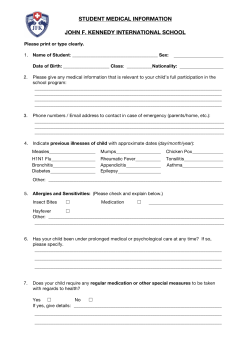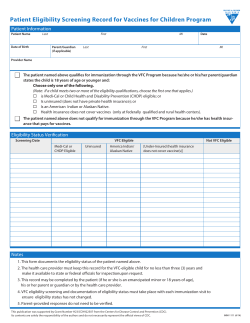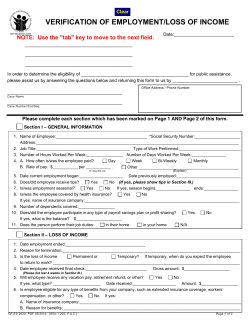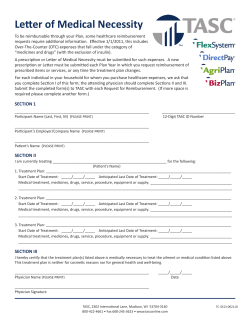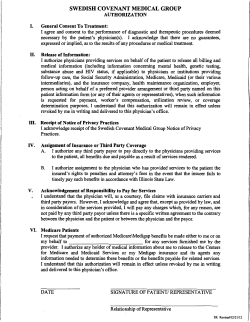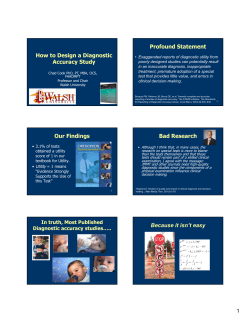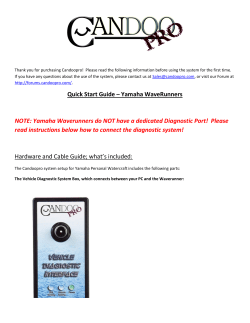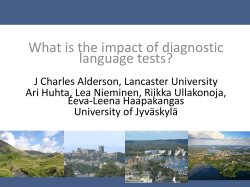
Bureau for Children with Medical Handicaps (BCMH)
Bureau for Children with Medical Handicaps (BCMH) BCMH Mission • The mission of the Bureau for Children with Medical Handicaps is to assure, through the development and support of high quality coordinated systems, that children with special health care needs and their families obtain comprehensive care and services which are familycentered, community-based and culturally competent. Funding Sources • Federal Maternal and Child Health Block Grant • State general revenue funds • County tax assessments • Hospital audit funds • Donation funds Diagnostic Program • To rule-out a handicapping condition • To diagnose a handicapping condition • To establish a plan of treatment • Authorization period – 3 months Diagnostic Program Eligibility • Under age 21 • Permanent resident of Ohio • Under the care of a BCMH-approved physician • Have a possible medical handicap • No financial eligibility requirement Diagnostic Program – Ineligible conditions/Services • Acute conditions/care • Emotional/behavioral problems • Learning disabilities • Routine well-child care • Physical exams • Experimental services Diagnostic Program Services • Basic Outpatient/Basic Physician Services (automatically authorized) • • • • Lab tests, x-rays, special tests Public health nurse services PT, OT, ST evaluations Consults/office visits to BCMH-approved physicians • Major Services (must be requested) • Up to 5 days inpatient hospitalization • Biopsies/anesthesia • Psych/Neuropsych evaluations Treatment Program • To provide on-going services for medically and financially eligible children, based on recognized standards • Authorization period: 1 year • Cases can be renewed yearly to age 21 with continued medical and financial eligibility Treatment Program Eligibility • Under age 21 (separate program for adults with cystic fibrosis) • Permanent resident of Ohio • Have an eligible medically handicapping condition • Financially eligible Treatment Program - Examples of Eligible Conditions • • • • • • • • Birth defects Cerebral palsy Spina bifida Congenital heart defects Hearing loss Cystic fibrosis Diabetes Severe vision disorders • • • • • • • • Cleft lip/palate Hemophilia Sickle cell disease AIDS Scoliosis Epilepsy Juvenile arthritis Chronic pulmonary disease • Cancer Treatment Program – Ineligible Conditions/Services • Acute conditions/care • Common refractive errors • Emotional/behavioral problems • Learning disabilities • Routine well-child care • Physical exams • Experimental care • Routine orthodontia problems Treatment Services • Service packages for 27 diagnoses and diagnostic categories, plus a “generic” service package • Service packages contain basic services as well as major services appropriate and most usually authorized for that diagnosis • Service package is printed out on the child’s Letter of Approval when case approved. Examples of Major Services on Treatment Program • Inpatient hospitalization • Medical supplies/equipment • Special formula • Surgery/anesthesia • Prescription medications • Therapies • Orthodontia services • Orthotics/prosthetics Example of a Service Package • Diabetes • Blood glucose monitor • Community nutrition consult • Dental consult • Routine dental services • Emergency room visits • Inpatient hospital • Nutrition consults • Basic outpatient services • PHN services • Physician care management • Basic physician services • Prescription meds • Psycholog. eval. • Medical supplies Financial Eligibility • When medical application form is received by the Bureau for treatment services for a child, a financial application packet is sent to the family • Packet contains the Combined Programs Application (CPA), information about the Medicaid Healthy Start Program, and instructions on how to complete the financial application process Financial Eligibility • Based on 185% of Federal poverty level • Financial formula considers child’s service level credit, actual child care expenses, and actual expense of health insurance premiums for the whole family • If over-income after initial determination, family placed on costshare. • Family can apply all their medical, dental, and vision expenses to help meet their costshare • When costshare is met, child is eligible for one year on the treatment program Application to the BCMH Program • For the diagnostic and treatment programs, the BCMH managing physician must complete and sign the Medical Application Form (MAF). • For the service coordination program, the team service coordinator must complete and sign the MAF • The parent or legal guardian (or client, if age 18 or older) must sign the MAF or the BCMH Release of Information Form before any action can be taken on the case Letter of Approval • When services have been approved, a Letter of Approval is sent to the parent, managing physician, hospital (if known), and the local health department Public Health Nurse Services • Authorized for every child on the BCMH Program • Identification of CSHCN and referral to appropriate providers/agencies • Service coordination • Home visits • Child/family/community assessments • Advocacy for children and families • Coordination with other agencies and systems that serve CSHCN, e.g. schools, MRDD, EI, JFS Contact Information for BCMH • Bureau For Children with Medical Handicaps P.O. Box 1603 Columbus, OH 43216-1603 1-800-755-4769 (Parents/clients only) Email: BCMH@odh.ohio.gov Or Contact your Doctor’s office to ask for a Medical application to be started.
© Copyright 2025



